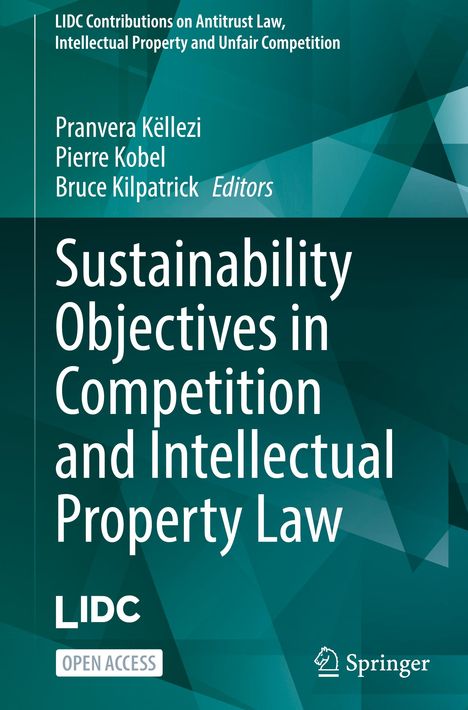Sustainability Objectives in Competition and Intellectual Property Law
Sustainability Objectives in Competition and Intellectual Property Law
Buch
- Herausgeber: Pranvera Këllezi, Bruce Kilpatrick, Pierre Kobel
lieferbar innerhalb 2-3 Wochen
(soweit verfügbar beim Lieferanten)
(soweit verfügbar beim Lieferanten)
EUR 54,75*
Verlängerter Rückgabezeitraum bis 31. Januar 2025
Alle zur Rückgabe berechtigten Produkte, die zwischen dem 1. bis 31. Dezember 2024 gekauft wurden, können bis zum 31. Januar 2025 zurückgegeben werden.
- Springer Nature Switzerland, 01/2024
- Einband: Gebunden, HC runder Rücken kaschiert
- Sprache: Englisch
- ISBN-13: 9783031448683
- Bestellnummer: 11734939
- Umfang: 436 Seiten
- Nummer der Auflage: 24001
- Auflage: 1st ed. 2024
- Gewicht: 816 g
- Maße: 241 x 160 mm
- Stärke: 29 mm
- Erscheinungstermin: 14.1.2024
- Serie: LIDC Contributions on Antitrust Law, Intellectual Property and Unfair Competition
Achtung: Artikel ist nicht in deutscher Sprache!
Weitere Ausgaben von Sustainability Objectives in Competition and Intellectual Property Law
Klappentext
This open access volume of LIDC contributions focuses on how competition and intellectual property laws incorporate sustainability objectives. Businesses are increasingly embracing sustainability objectives, driven by the international community. Although competition and intellectual property law are certainly not the only tools for addressing sustainability issues, they can play a role in moving toward a more sustainable society.Sustainability has gained prominence in competition law in all jurisdictions covered in this volume. The contributions focus on classic questions such as whether sustainability agreements restrict competition and, if so, to what extent businesses can be exempted on efficiency grounds. The papers also raise a number of questions, in particular concerning the treatment of non-market efficiencies. The soft law and case law produced by competition authorities are examined, and the leadership role of some competition authorities in the field from advocacy to policy papers and sustainability guidelines is highlighted. The authors call for more individual guidance to provide enhanced transparency and clarity to industry, advisors and society at large on sustainability issues, with guidelines or sustainability-related block exemptions providing even greater legal certainty.
With regard to intellectual property, the contributions examine various important issues, such as the need for intellectual property rights to remain technology-neutral, ways to promote the use of sustainable technologies and incentives for licensing, and ways to promote the dissemination of sustainable technologies, including compulsory licensing, cross-licensing, open source or FRAND licensing, and replacing the destruction of counterfeit goods with recycling. The papers also discuss greenwashing and how it can be addressed through revisions to trademarks and related rights.


